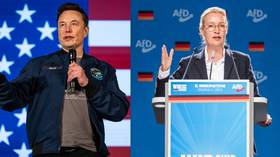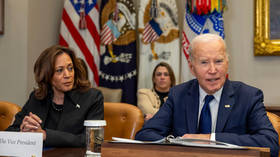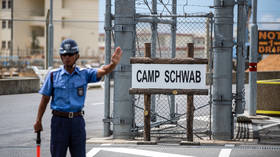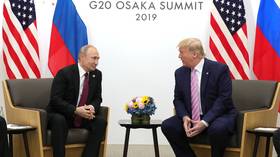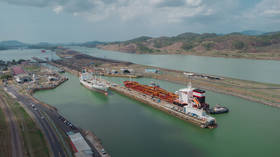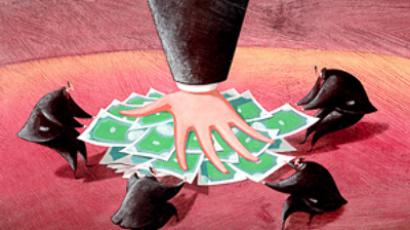G-20: A force for good, or another evil empire?

Proponents of the world’s biggest economic talk shop insist they have the best interests of the planet and its people at heart. But why so much secrecy and over-the-top police presence every time they meet?
Under the auspices of the G-20, world leaders and bankers are assembling in Pittsburgh, Pennsylvania – America's poster city for revitalization – to come to grips with the financial crisis, capitalism’s worst headache since the Great Depression. The medication these individuals prescribe will inevitably have repercussions for every human being for many years to come.
The significance of the two-day meeting – Barack Obama’s first international summit as president – was summed up in a Reuter’s headline: “New world economic order takes shape at G-20.”
But first, what is a G-20 anyways?
Somewhat surprisingly, G-20 stands for “The Group of Twenty Finance Ministers and Central Bank Governors,” which may lead one to believe that all those heads of state we see rubbing shoulders at these functions are merely crashing an extravagant banker's bash. At the very least, watching our democratically elected representatives mingling and sipping wine with the masters of the economic universe can be a bit unsettling.
Central bankers, after all, as well as the heads of all international financial institutions (IMF, WTO, World Bank), are not elected into their positions, but rather selected by heads of state.
The G-20 is comprised of representatives from 20 countries, including the European Union.
So what is the ultimate purpose of the G-20, besides “global domination,” as the anarchists and anti-globalist protesters would lead us to believe every time this group pulls into a new harbor?
According to the group’s low-key website, “The G-20 was created in 1999 as a response both to the financial crises of the late 1990s and to a growing recognition that key emerging-market countries were not adequately included in the core of global economic discussion and governance.”
Opponents of the G-20, and other similarly large and unaccountable organizations, point to this mission statement as testimony to less than benevolent aspirations.
The G-20 says it includes nations “not adequately included in the core of global economic discussion and governance.” Yet their proceedings invariably occur behind locked doors, behind police barriers, which only serves to increase the suspicions of the already suspicious.
Given the atmosphere of total secrecy and security at these events, a very strong impression is created that these international summits between the bankers and political leaders are only concerned with further enriching the fat cats of the corporate world. In other words, what is good for the rich will ultimately benefit the poor, even if it may take a few more centuries.
“This is where the G-20 totally fails the democracy litmus test,” says Shawna Taylor, a spokesperson with Code Pink, a group that draws attention to the plight of females in wartime. “They talk about open dialogue, yet they fence off the entire city of Pittsburgh so that just the chosen few can speak their minds.”
Maybe there is a chance you can get on the G-20s regular mailing list? Sorry, although the international organization collectively represents 85% of global national product, 80% of global trade and two-thirds of the global population, it apparently lacks the funds to put up an awning and hire a secretary: the group has no headquarters, no permanent residence, nothing tangible to throw a brick at, so to speak. But you are welcome to send an email to the G-20, which is currently chaired by England, to the following email address: g20uk.publicenquiries@hm-treasury.gov.uk
But happily, as abovementioned, the organization does own a website, which states, in bureaucratic lingo, “The G-20… will send a strong signal that it is prepared to take whatever further actions are necessary to stabilize the financial system and to provide further macroeconomic support.”
One thing that is disturbingly absent from the G-20’s mission statement is any allusion to assisting consumers and workers, the real victims of the financial fallout; after all, even the environment is allotted a one-line mention.
Should we not be little apprehensive about the G-20 agreeing to take “whatever further actions are necessary” to resuscitate the global economy, especially when these initiatives will not be open for public discussion? If their decisions prove disastrously wrong, as has happened so many times in the past, the only democratic recourse we will then have is to read all about it in the free media. That is called democracy working in reverse.
Clearly, the G-20’s main goal is to stabilize the “financial system,” a vague term that is casually kicked around without any real understanding as to what it actually means.
What is a financial system?
Before attempting to understand the function of a monstrous organization like the G-20, we must understand what a “financial system” is, since that is really the overarching concern of the
G-20.
Briefly, a (global) financial system is responsible for loaning out, through its affiliate central banks, vast sums of money to cash-strapped nations, of which there are no shortage of right now. And as the U.S. Federal Reserve System (Central Bank) recently demonstrated, there is always enough money to meet the demand. If the system requires an infusion of dollars (which is the world’s reserve currency), it simply turns on the printing press and produces more of the greenbacks.
The total lack of governmental oversight over this process – it is important to remember that the U.S. Federal Reserve is a private institution that is not answerable to the government – was dragged into the light during a recent Congressional debate.
In a rare populist moment of The People versus The Bankers, Florida Congressman Alan Grayson unmercifully grilled Federal Reserve Chairman Ben Bernanke during a House Financial Services Committee in July. The mild interrogation involved the Central Bank unloading over half a trillion dollars around the world in the midst of the financial crisis without government consent.
“The Central Bank Liquidity Swaps,” stated Grayson, making reference to a section of the Federal Reserve’s annual account book, “shows an increase from the end of 2007 from $24 billion dollars to $553 billion dollars… at the end of 2008.”
“What’s that,” Grayson asks incredulously.
Bernanke responds that “those are swaps that were done with foreign central banks. Many foreign banks are short dollars, and so they come into our markets looking for dollars…”
“So who got the money,” Grayson implores.
“I don’t know,” replies the chief of the Central Bank.
“Half a trillion dollars and you don’t know who got the money,” asks Grayson.
In the days before the Crash of 2009, it was possible to ignore such unsightly debates. But today, with people feeling the acute sting of crisis, at the same time Wall Street brokers are cashing bonus checks, more and more individuals want answers to questions they never asked before. And the politicians, always with their nose to the changing opinion currents, see a golden opportunity to win the support of new constituents.
The heated exchange between a US Congressman and the Central Bank head is indicative of the course of action world leaders have taken to combat the crisis: For America, England and Japan the general approach is to sandbag against the river of financial fallout with bags of newly minted money, courtesy of the Federal Reserve.
What this extremely risky strategy will mean for US consumers in particular and the US economy in general is anybody's guess, but it takes little imagination to envision out-of-control inflation and even the total collapse of the dollar, as more than one economist has predicted.
Others, like traditionally cautious Europe, has taken a more conservative approach and is demanding that the rules of the financial road be rewritten, while injecting a very limited amount of money into the system.
Protectionism is back
Despite all of the promises and ill-feelings that will certainly surface in Pittsburgh (32 protesters have been arrested so far, as clashes with police continue), one trend is indisputable: nations are protecting their markets at an unprecedented rate. This is the most dangerous part of every economic downswing, and could disrupt any efforts of an early recovery.
Since November’s G-20 summit in Washington, member states have pushed through about 100 separate trade-restricting provisions.
Last week, for example, the United States announced a 35 % tariff against Chinese-made tires, which is somewhat explainable by China’s seemingly crisis-resistant economy. The mighty Middle Kingdom is projected to grow 8.2% in 2009 before rising to almost 9 % next year, says the Asian Development Bank.
Meanwhile, the United States, where the financial crisis first appeared, is witnessing a steady drop in trade: US exports of $86.7 billion in July were more than 26 % below the level of the same month last year, according to data from the US Commerce Department. Meanwhile, new home sales declined 2.7 percent in August as the US struggles with declining wages and unemployment.
Still, prying open national markets will be a major theme in Pittsburgh.
“We’re going to keep this under control,” Uri Dadush, of the Carnegie Endowment’s international economic program, told USA Today.
Meanwhile, the “core” nations of the economic order are coming around to the painful realization that the center of the economic solar system has shifted eastward.
Of the G-20’s elite membership, only China, India and Indonesia are posting positive GDP rates since the financial crisis first struck last year. All of the other members, including the United States, are doggy-paddling in troubled waters.
This new economic environment has given the G-20 new significance. While the G-8 will most likely focus on issues involving global security, including the threat of terrorism, the G-20 will become the new international format for discussing global markets. Some even say the G-8 will eventually fade away.
A capital challenge
Whatever agreements finally emerge from the G-20 summit, one thing is clear: popularity ratings for Capitalism are at an all-time low, as witnessed by a spate of articles on the subject, including Naomi Klein's book "The Shock Doctrine: The Rise of Disaster Capitalism," and a recent article in Rolling Stone magazine that argues, "Goldman Sachs (the investment bank) has engineered every major market manipulation since the Great Depression."
Meanwhile, with an uncanny sense of cinematic timing, Michael Moore’s latest documentary film, “Capitalism: A Love Story,” which drags the American Dream over the coals, opened in theaters in the United States just as the G-20 was pulling into Pittsburgh.
In an interview with Larry King, Moore said it is important to “follow the money” if you want to discover where the power is.
“I’ve covered a number of issues and different things,” Moore said. “But it all seems to come back to this one issue of “follow the money.”
“Who’s got the money? And whoever has the money has the power. And right now, in America, Larry, the richest 1 percent have more financial wealth than the bottom 95 percent combined.”
King asked Moore if capitalism has been a “failure.”
“Yes… Capitalism, in the last year, has proven that it’s failed,” Moore replied. “All the basic tenets of what we’ve talked about the free market, about free enterprise and competition just completely fell apart. As soon as they lost, essentially, our money, they came running to the federal government for a bailout – for welfare, for socialism. And I thought the basic principle of capitalism was that it’s a sink-or-swim situation.”
“If you run your business the wrong way,” Moore continued, “where does it say that you or I or anybody… has to bail them out”?
It seems that many people are asking that very same question today, and it will be interesting to see if the members of the G-20 can steer clear of the rocks of suspicion that they themselves have aroused, while negotiating the tidal wave of financial turmoil.
Clearly, whatever are the success stories that emerge from Pittsburgh, they will require some very tricky maneuvering.


